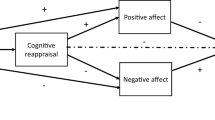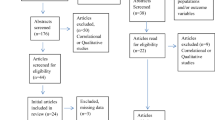Abstract
Mindfulness-based interventions (MBIs) are efficacious and effective for a variety of mental and physical health problems. Mindfulness meditation is a primary therapeutic strategy employed within MBIs and is hypothesized to increase mindfulness and, in turn, lead to positive outcomes. However, evidence in support of mindfulness meditation practice as a key treatment component in MBIs is mixed, in part because little is known about how prescribed meditation practice times and adherence to home-based meditation practice relate to one another and outcomes. The present study evaluated relations among adherence, meditation practice time, and psychiatric symptoms following two 2-week mindfulness meditation interventions: one that prescribed 10-min daily meditation and another that prescribed 20-min daily meditation. Participants (N = 77; female = 56, M age = 20.16; White = 51.9%; African American = 14.3%; Hispanic = 14.3%; Asian = 10.4%; other = 6.5%; multiethnic = 2.6%) also completed daily diaries to assess adherence. Results indicated no significant group difference in total days meditated or overall time spent meditating. Stress declined and mindfulness increased over the 2 weeks for both groups. Despite no difference in adherence, participants in the 20-min group reported larger increases in self-compassion relative to those in the 10-min group. Implications for enhancing adherence within MBIs are discussed.

Similar content being viewed by others
References
Antony, M. M., Bieling, P. J., Cox, B. J., Enns, M. W., & Swinson, R. P. (1998). Psychometric properties of the 42-item and 21-item versions of the depression anxiety stress scales in clinical groups and a community sample. Psychological Assessment, 10, 176–181. doi:10.1037/1040-3590.10.2.176.
Arch, J. J., & Craske, M. G. (2006). Mechanisms of mindfulness: emotion regulation following a focused breathing induction. Behaviour Research and Therapy, 44, 1849–1858. doi:10.1016/j.brat.2005.12.007.
Birnie, K., Speca, M., & Carlson, L. E. (2010). Exploring self-compassion and empathy in the context of mindfulness-based stress reduction (MBSR). Stress and Health, 26, 359–371. doi:10.1002/smi.1305.
Brown, K. W., & Ryan, R. M. (2003). The benefits of being present: mindfulness and its role in psychological well-being. Journal of Personality and Social Psychology, 84, 822–848. doi:10.1037/0022-3514.84.4.822.
Call, D., Miron, L., & Orcutt, H. (2014). Effectiveness of brief mindfulness techniques in reducing symptoms of anxiety and stress. Mindfulness, 5, 658–668. doi:10.1007/x12671-013-0218-6.
Carmody, J., & Baer, R. A. (2008). Relationships between mindfulness practice and levels of mindfulness, medical and psychological symptoms and well-being in a mindfulness-based stress reduction program. Journal of Behavioral Medicine, 31, 23–33.
Crane, C., Crane, R., Eames, C., Fennell, M. J. V., Silverton, S., Williams, J. M. G., & Barnhofer, T. (2014). The effects of amount of home meditation practices in mindfulness based cognitive therapy on hazard of relapse to depression in the staying well after depression trial. Behaviour Research and Therapy, 63, 17–24. doi:10.1016/j.brat.2014.08.015.
Crawford, J. R., & Henry, J. D. (2003). The depression anxiety stress scales (DASS): Normative data and latent structure in a large non-clinical sample. British Journal of Clinical Psychology, 42, 111–131. doi:10.1348/014466503321903544.
Davidson, R. J., & Kaszniak, A. W. (2015). Conceptual and methodological issues in research on mindfulness and meditation. American Psychologist, 70, 581–592. doi:10.1037/a0039512.
Del Re, A., Flückiger, C., Goldberg, S. B., & Hoyt, W. T. (2013). Monitoring mindfulness practice quality: an important consideration in mindfulness practice. Psychotherapy Research, 21, 54–66. doi:10.1080/10503307.2012.729275.
Dimidjian, S., & Segal, Z. V. (2015). Prospects for a clinical science of mindfulness-based intervention. American Psychologist, 70, 593–620.
Eberth, J., & Sedlmeier, P. (2012). The effects of mindfulness meditation: a meta-analysis. Mindfulness, 3, 174–189. doi:10.1007/s12671-012-0101-x.
Eifert, G. H., & Forsyth, J. P. (2005). Acceptance & commitment therapy for anxiety disorders: A practitioner’s treatment guide to using mindfulness, acceptance, and values-based behavior change strategies. Oakland: New Harbinger.
Glenn, D., Golinelli, D., Rose, R. D., Roy-Bryne, P., Stein, M. B., Sullivan, G., et al. (2013). Who gets the most out of cognitive-behavioral therapy for anxiety disorders? Journal of Consulting and Clinical Psychology, 81, 639–649. doi:10.1037/a0033403.
Gotink, R. A., Chu, P., Busschbach, J. J. V., Benson, H., Fricchione, G. L., & Hunink, M. G. M. (2015). Standardised mindfulness-based interventions in healthcare: an overview of systematic reviews and meta-analyses of RCTs. PloS One, 10, e0124344. doi:10.1371/journal.pone.0124344.
Hayes, S. C., Strosahl, K. D., & Wilson, K. G. (2012). Acceptance and commitment therapy, second edition: The process and practice of mindful change. New York: The Guilford Press.
Henry, J., & Crawford, J. (2005). The short-form version of the depression anxiety stress scales (DASS-21): construct validity and normative data in a large non-clinical sample. British Journal of Clinical Psychology, 44, 227–239. doi:10.1348/014466505X29657.
Hofmann, S., Sawyer, A. T., Witt, A. A., & Oh, D. (2010). The effect of mindfulness-based therapy on anxiety and depression: a meta analytic review. Journal of Consulting and Clinical Psychology, 78, 169–183. doi:10.1037/a0018555.
Horn, H. L., & Maxwell, F. R. (1983). The impact of task difficulty expectations on intrinsic motivation. Motivation and Emotion, 7, 19–24. doi:10.1007/BF00992962.
Huffziger, S., Ebner-Priemer, U., Eisenbach, C., Koudela, S., Reinhard, I., Zamoscik, V., et al. (2013). Induced ruminative and mindful attention in everyday life: An experimental ambulatory assessment study. Journal of Behavior Therapy and Experimental Psychiatry, 44, 322–328. doi:10.1016/j.jbtep.2013.01.007.
Kabat-Zinn, J. (1990). Full catastrophe living: using the wisdom of your body and mind to face stress, pain, and illness. New York: Random House.
Kabat-Zinn, J. (1994). Wherever you go, there you are: mindfulness meditation in everyday life. New York: Hyperion.
Kabat-Zinn, J. (2002). Sitting meditation. On Guided mindfulness meditation: Series 1 [CD]. Boulder: Sounds True.
Kazdin, A. E., & Blasé, S. L. (2011). Rebooting psychotherapy research and practice to reduce the burden of mental illness. Perspectives on Psychological Science, 6, 21–37. doi:10.1177/1745691610393527.
Khoury, B., Lecomte, T., Fortin, G., Masse, M., Therien, P., Bouchard, V., et al. (2013). Mindfulness-based therapy: a comprehensive meta-analysis. Clinical Psychology Review, 33, 763–771. doi:10.1016/j.cpr.2013.05.005.
Khoury, B., Shama, M., Rush, S. E., & Fournier, C. (2015). Mindfulness-based stress reduction for healthy individuals: a meta-analysis. Journal of Psychosomatic Research, 78, 519–528. doi:10.1016/j.jpsychores.2015.03.009.
Kohls, N., Sauer, S., & Walach, H. (2009). Facets of mindfulness–results of an online study investigating the Freiburg Mindfulness Inventory. Personality and Individual Differences, 46, 224–230. doi:10.1016/j.paid. 2008.10.009.
LeBeau, R. T., Davies, C. D., Culver, N. C., & Craske, M. G. (2013). Homework compliance counts in cognitive behavioral therapy. Cognitive Behaviour Therapy, 3, 171–179. doi:10.1080/16506073.2013.763286.
Linehan, M. M. (1993). Cognitive-behavioral treatment of borderline personality disorder. New York: The Guilford Press.
Lovibond, S. H., & Lovibond, P. F. (1995). Manual for the depression anxiety stress scales (2nd ed.). Sydney: Psychology Foundation of Australia.
MacKillop, J., & Anderson, E. J. (2007). Further psychometric validation of the mindful attention awareness scale (MAAS). Journal of Psychopathology and Behavioral Assessment, 29, 289–293. doi:10.1007/s10862-007-9045-1.
Minor, H. G., Carlson, L. E., Mackenzie, M. J., Zernicke, K., & Jones, L. (2006). Evaluation of a mindfulness-based stress reduction (MBSR) program for caregivers of children with chronic conditions. Social Work in Health Care, 43, 91–109. doi:10.1300/J010v43n01_06.
Neff, K. D. (2003a). The development and validation of a scale to measure self-compassion. Self and Identity, 2, 223–250. doi:10.1080/15298860390209035.
Neff, K. (2003b). Self-compassion: an alternative conceptualization of a healthy attitude toward oneself. Self and Identity, 2, 85–101. doi:10.1080/15298860390129863.
Neff, K. D., & Germer, C. K. (2013). A pilot study and randomized controlled trial of the mindful self-compassion program. Journal of Clinical Psychology, 69, 28–44. doi:10.1002/jclp.21923.
Nyklíček, I., & Kuijpers, K. F. (2008). Effects of mindfulness-based stress reduction intervention on psychological well-being and quality of life: Is increased mindfulness indeed the mechanism? Annals of Behavioral Medicine, 35, 331–340. doi:10.1007/s12160-008-9030-2.
Primakoff, L., Epstein, N., & Covi, L. (1986). Homework compliance: an uncontrolled variable in cognitive therapy outcome research. Behavior Therapy, 17, 433–446.
Segal, Z. V., Williams, J. M. G., & Teasdale, J. D. (2002). Mindfulness-based cognitive therapy for depression: a new approach to preventing relapse. New York: The Guilford Press.
Taylor, S. (2000). Understanding and treating panic disorder: cognitive-behavioural approaches. New York: Wiley.
Vettese, L. C., Toneatto, T., Stea, J. N., Nguyen, L., & Wang, J. J. (2009). Do mindfulness meditation participants do their homework? And does it make a difference? A review of the empirical evidence. Journal of Cognitive Psychotherapy: An International Quarterly, 23, 198–225. doi:10.1891/0889-8391.23.3.198.
Walach, H., Buchheld, N., Buttenmuller, V., Kleinknecht, N., & Schmidt, S. (2006). Measuring mindfulness: the Freiburg mindfulness Inventory (FMI). Personality and Individual Differences, 40, 1543–1555. doi:10.1016/j.paid.2005.11.025.
Yamada, K., & Victor, T. L. (2012). The impact of mindful awareness practices on college student health, well-being, and capacity for learning: a pilot study. Psychology Learning & Teaching, 11, 139–145. doi:10.2304/plat.2012.11.2.139.
Zayfert, C., & Black, C. B. (2000). Implementation of empirically supported treatment for PTSD: obstacles and innovation. The Behavior Therapist, 23(161–162), 164–168.
Author information
Authors and Affiliations
Corresponding author
Ethics declarations
Conflicts of Interest
The authors declare that they have no conflict of interest.
Rights and permissions
About this article
Cite this article
Berghoff, C.R., Wheeless, L.E., Ritzert, T.R. et al. Mindfulness Meditation Adherence in a College Sample: Comparison of a 10-Min Versus 20-Min 2-Week Daily Practice. Mindfulness 8, 1513–1521 (2017). https://doi.org/10.1007/s12671-017-0717-y
Published:
Issue Date:
DOI: https://doi.org/10.1007/s12671-017-0717-y




